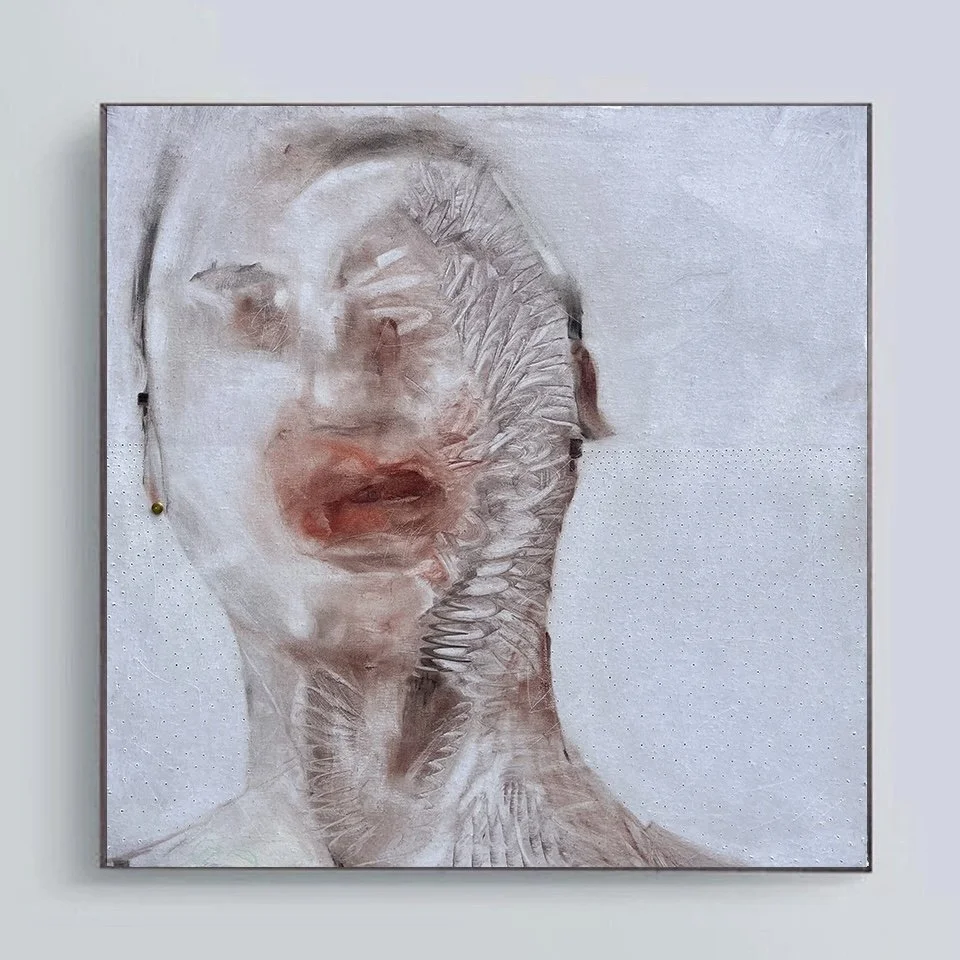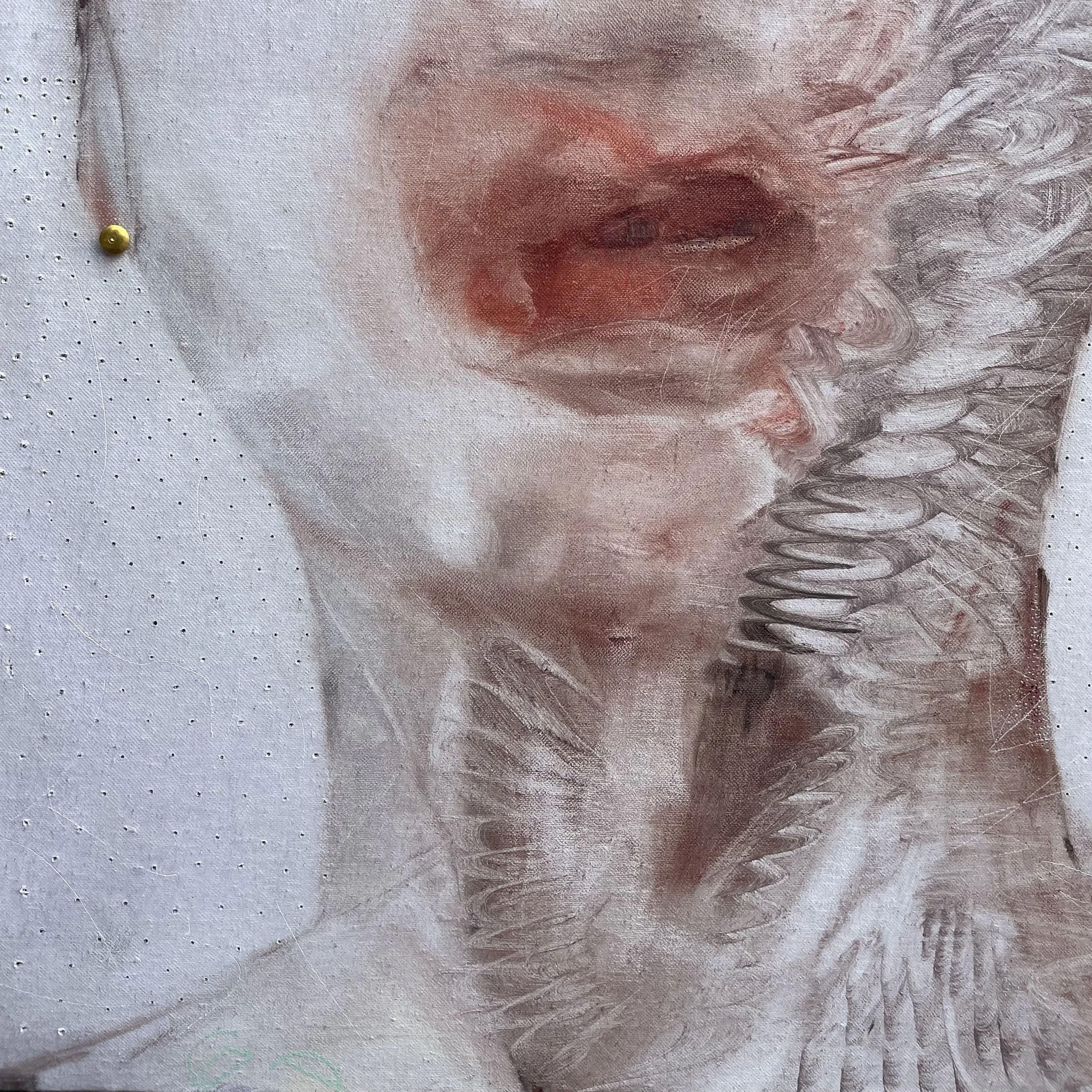Hot Coffee with Tbilisi-based artist Bakhrom Alimov (guest interview by D. Finestein)
Guest post David Finestein is a writer and founder of Dissolution Gallery in Tbilisi. He writes a newsletter on Substack called What I Learned This Week.
The expat art scene in Tbilisi has been growing. I’ve been living here for just over two years and have witnessed some of this first-hand. Its growth was further accelerated by Russia’s full-scale invasion of Ukraine in 2022, when many artists from Russia, Ukraine and neighboring countries made Georgia their temporary home. I once made a joke on my Instagram stories about taking a bus from Tbilisi to Istanbul instead of flying. Bakhrom Alimov, a Russian artist of Uzbek origin, responded to my story. He mentioned that he had done that exact journey a few months earlier, and that it wasn’t too bad.
Alimov moved to Tbilisi two years ago from Russia after the start of the war. His career was slowly taking off in Russia, but he had to start over in Tbilisi. Months went by after our brief exchange, but I finally arranged to meet Bakhrom in his studio and find out more about what he’s been working on.
David: Imagine you are in your favorite coffee or tea spot. Where is it? What are you drinking? What are the three things you see right now?
Bakhrom: If I’m honest, I’m not a fan of coffee shops, but I can’t imagine my mornings without coffee. For me, the best coffee is made at home in a cezve (Turkish coffee). When I hold the cup in my hand, I see a blank canvas and an album cover on Spotify, followed by me starting work for that day.
Bakhrom Alimov, Suicide algebra, 2024. Oil on canvas, 60 × 60 cm (24 × 24 in)
David: David: When we first met, you mentioned that you feel more creative freedom in Georgia relative to when you lived in Moscow. Do you think that has changed the direction of your latest work? Do you feel like you’re able to express yourself more freely now?
Bakhrom: Living as an expat in Georgia feels freer and safer than living in Russia. This freedom affects your mental state and emancipates you creatively. When necessary, it becomes easier to detach oneself from the outside world, focusing solely on the task at hand.
The decision to come to Georgia has significantly influenced my work. Not worrying about going to jail due to a post on social media is also a huge plus.
Bakhrom Alimov, Home Season,2022.Mixed media, 70 x 50 cm (28 x 20 in.)
David: You spent a night in jail for writing graffiti in Prague. What happened?
Bakhrom: I never considered myself to be a street artist. It just happened that graffiti culture was actively developing at that time, even becoming mainstream at one point.I got into it because there wasn't anything to do in my neighborhood growing up. My friends and I formed a collective, and we started doing graffiti.
I was 19 when I was able to save up enough money to travel to Europe for the first time. The Russian ruble was relatively strong at the time, and a trip to Czechia, a country with an Amsterdam-like approach to leisure for young people, was very cheap.
It’s funny, but when we first arrived in Prague and saw the walls covered in graffiti, we were surprised. You’d often see this kind of thing in Europe, and here in Tbilisi as well, but in Moscow, what goes up one day will be painted over by the city the next — typical Moscow situation.
Moreover, the graffiti style in this part of Europe was quite dark. I didn’t yet understand how a medieval cathedral could have dark characters on it that haven’t been painted over for 5 years.
Since it was ubiquitous, we became convinced that graffiti was more-or-less allowed. We were so sure of ourselves that we climbed onto the roof of a residential building in the center of Prague, joint and camera in hand. We were in handcuffs fifteen minutes later.
The police called us, “Russian bastards,” mentioning Crimea and Putin. This was 2014, and Euromaidan and the annexation of Crimea were fresh on people’s minds. I didn’t realize that we were treated unusually at the police station until I was older.
We ended up spending two nights there because the police wanted us to miss our flight and overstay our visas. If we had overstayed even for a day, future trips to Europe would’ve been impossible. We ended up getting a slap on the wrist, banned from entering Czechia for two years and a confiscated sketch book. This was a happy ending for us, all things considered. We didn’t end up overstaying our visas.
Many years later I returned to Prague, but that’s a story for another time.
David: Choose one work that you recently completed. What influenced you to make it? What does it represent?
Bakhrom: My most recent work is aptly named Suicide Algebra. It’s an expressive portrait that greatly differs from my other works. I made it very quickly; it’s a spur of the moment, emotional piece. I visualized a blurred and screaming degeneration of faces up close.
It’s a representation of the pain that we bury deep inside ourselves, a pain we pretend doesn’t exist. The deformed portions of the face resemble a skin infection, a representation of our worries, fears and insecurities. It’s something that you get used to with time. It becomes a part of you and your personality.
I have these recurring thoughts, but I have overcome them and can now express them on canvas. It’s more instinctual than conscious.
Bakhrom Alimov, Suicide algebra, 2024 (detail). Oil on canvas, 60 × 60 cm (24 × 24 in)
David: How do you see the future of the emigrant Russian art scene? A lot of artists are moving to Europe but continue exhibiting and selling to their collectors in Russia. Do you see a huge gap between what Russian and European collectors are interested in?
Bakhrom: I only recently started taking art seriously, for about 6 months before I left Russia, so I can’t say that I’m well-versed in the nuances of the art market. The art communities in many European countries have closed their doors to artists from Russia, Georgia amongst them.
Being an outsider in a new scene is a substantial barrier for an artist. That’s why I’m trying not to miss any open calls. Like many other Russian artists in exile, I have no choice but to continue selling on the Russian art market.
What’s going to happen next isn’t clear, but these circumstances have pushed me and others like me toward participating in the global art market. It’s something many of us wanted to do but were putting off.
David: Your origins are in the Moscow electronic music scene. How does the Tbilisi scene differ?
Bakhrom: For many, the electronic music scene in Georgia is quite different from that of Russia; it feels more European. People in Georgia come to parties to let out everything that they’ve bottled up inside of them. There’s more freedom and privacy here in Georgia.
In Russia it’s hard to find an event where everything isn’t being recorded. The fact that most Georgian venues prohibit photo and video plays a huge role. The approach to sound and light production also makes a difference. A resident of Tresor in Berlin can casually come to Cafe Gallery to spin on a Tuesday, when in Moscow it would be the party of the year.
I’m not a big fan of techno per-se, but after coming here, I see that there’s a techno renaissance happening in the Caucasus, and it blows my mind.
(Responses translated from Russian).
Bakhrom Alimov, Waiting to Die, 2024. 100 x 80 cm (40 x 32 in.). Oil on canvas
Thank you David Finestein for the interview.





